The escalation of extreme weather events across the globe is alarming everyone that has been directly impacted, as well as those paying close attention. It seems very apparent we are well past the point we can keep ignoring this, because it’s right before our eyes. Surely, we’re going to get the message and do what we need to do, yes? Alas, no.
I hear people making this observation regularly – whenever I speak to anyone who’s paying attention to the climate, they’re all so depressed, I don’t want to go there.
I completely understand. Why would anyone willingly put themselves into such a dark place?
But I need to tell you a secret.
Those of us who are paying attention to and speaking up on climate change, extreme weather events, biodiversity loss, extinctions, forever chemicals, the state of our oceans, crumbling infrastructure, lack of trust, rising authoritarianism, failing democracies, etc, etc.., aren’t depressed about what’s coming – we’ve already accepted that, because we’ve had to. You’d go mad if you didn’t get to acceptance.
No, what we ARE alarmed about is how many people are ignoring it and willing to walk into this blind. We’re also alarmed because for every minute we wait to do something, the impacts get worse for all of us. We are all linked in this story my friends.
The world seems split into four different types of people
- Those paying attention and looking at all possibilities, including what it means to all life on earth, as well as taking any action to help wake the world up so we can get ready
- Those who know something really bad is happening but have put their heads in the sand, because if you ignore it, it might go away. The other side is a deep feeling of hopelessness and not knowing what to do
- Those who have no awareness at all that anything is going on and are getting on with business-as-usual, which makes it feel like we’re living in a dichotomy
- And those denying it, fighting tooth and nail with falsehoods and data that has been debunked many times over… This group can be trolls or bots, as well as those being paid by the biggest polluting industries to continue to create confusion
I am in category one, and when you can see the roadmap of the future, one way or another – one of the clearest messages is this – until enough of us understand what’s happening and mobilize globally to do something about it, the worst possible outcomes are in front of us, with many already being felt.
That’s where the despair is, the lack of action and attention being given to the crisis. We need to be going hard now, doing everything we can to address this, as well as adapting at warp speed, but we’re still talking about it, arguing about it, or not acknowledging it at all.
Adaptation should be on everyone’s lips today, with or without government support. So many are in the path of chaos and they are not ready – that disturbs me enormously.
Why care at all?
Obviously, I can’t speak for others who feel like I do, but I certainly don’t want my friends, family or community facing this unprepared, and yet we see this massive disconnect between what is coming, what we need to do to get ready, and how we need to transform everything we know and love to limit how much worse it will get.
My goal for all content I share is about encouraging us to pay attention now so we can get prepared. I don’t want anyone sideswiped by this, I really don’t.
Like many many people, I’ve spent years, decades, looking at the thousands of stories/reports on the multiple crises’ we face, attempting to bring it all together to make sense of what we are dealing with.
I do this because I need to make sense of it (it’s how I’m wired), but I am also driven to do this so I can understand the risks, and then be prepared to make decisions for my family, as well as help my community and the world.
We are now at the point of having entered an extremely challenging time – with so many unknown impacts coming our way and fast – where real action is needed, at scale and with urgency. When you look at all the pieces of this puzzle, you start to understand the threats (short and long term), as well as what we must do and prioritize if there is any chance of turning it around.
I haven’t lost hope
This is important. I still hold onto hope. I don’t think it’s a lost cause, no matter how many others believe it is, because if we can mobilize globally and get to work in vast numbers everywhere on earth, we might just be able to change direction, or at least, reduce the impact of extreme events. If we know, we can prepare our homes for what is to come, rather than being hit by it before we wake up!
When people say there is no chance we can do anything about this now, what I interpret them saying is WE are not capable of making these changes as a global society, and well, maybe they’re right. It certainly looks that way when we listen to the global narrative.
However, if enough of us succeed in sharing the message of change and action, I believe we can achieve what most think is impossible. Oh sure, it’s not an easy task to set ourselves, but it’s not impossible, we just need to get louder and braver.
One point that’s important to acknowledge is this
Even if we do everything possible, we may not succeed, but there is no other option than to try our very best. If we fail while working together, it is much better than failing while being ripped apart – which is what is happening now.
Our societal divisions are our real enemy today and in the future. These divisions are making it impossible for us to unite and get to work, and it is destroying the foundations of the societies we all claim to love and want to protect. It’s crazy what’s going on.
So, are we really going to keep waiting for it to get worse before we do something? History proves that this is probably the case.
Are we really going to allow the powers that seek to divide us win? Because they are NOT on our side, not at all.
My biggest conclusion and where I see genuine hope, after looking at all the possible outcomes is, if we can create widespread awareness and global action now, we might just achieve something remarkable. That’s where the hope is. Massive mobilization, and we CAN do it. We MUST do it too.
To achieve that, we need as many influential people speaking up and raising the alarm. We also need to skip the despair stage and get straight into action.
The challenge
The biggest challenge I face is, I haven’t found the magic formula on how to share that message in a way that creates awareness and drives massive change. I don’t know if anyone else has either.
The problem is, there is no soft landing with this message. There is no positive spin, and because we have built a society where positive spin is a centrepiece of comfort in our societies, we’re in a bit of a bind. More so, because the reality staring us in the face is a big ugly beast, and until we face it, we can’t change anything.
So just to restate what I shared above, here’s the hope – you, me and billions of people stop what we’re doing now, and we work together to turn things around. We clean it up, rewild our world everywhere, reduce our impact, eat cleaner, say no to industries destroying the planet, and shrink humanities impact on earth as quickly as we can, while taking care of the people who’ve done the least to contribute to this situation and while we’re at it, let’s make sure we don’t vote in authoritarian leaders, because they will be a disaster for all of us! We can do that, yes?
But how do we help people become aware who are not already paying attention?
How do we get them to listen and understand the urgency?
How do we get a majority moving and acting with urgency so we can do something about this before it’s too late to do anything at all?
And how do we do this when many just don’t want to hear it, because it is very hard to bear? Or because it cripples people with fear?
Then I saw this quote
“When you want to help people, tell them the truth. When you want to help yourself, tell them what they want to hear.”
Thomas Sowell.
And well, that resonated.
I don’t want to help myself; I don’t care about me to be honest. But I do very much care about my boys and their future, as well as all the children in the world, but if I only tell people what they want to hear, that’s not going to cut it. We’re not going to help the kids.
My passive approach isn’t working, what should I do?
I’ve consistently put word out on many aspects of the polycrisis on social media for years. One strategy I decided early on is to be very careful about not correcting others who speak up and share information contradicting mine, because they have the absolute right to do that. I also try not to push my message into private groups if I can help it, because I respect that not everyone is ready to hear it.
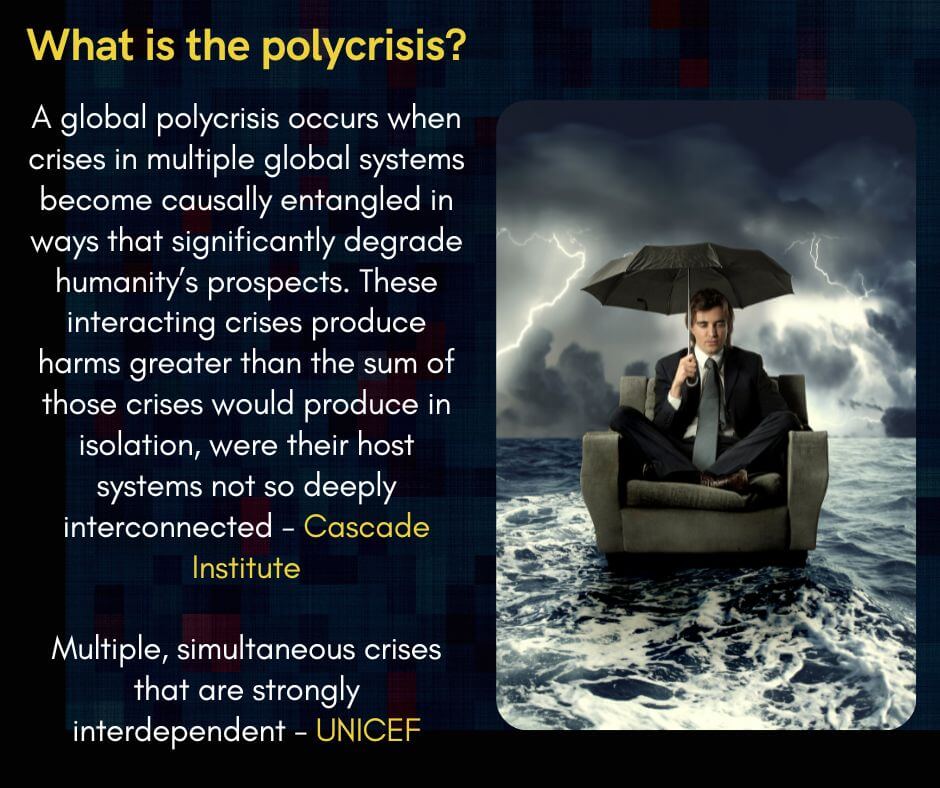
Therefore, my main approach has always been to participate ‘out there’ on social media, consistently raising awareness on the issues we face, hoping that over time, the message will cut through and momentum will start happening.
And momentum is happening – not because of me, but because of thousands of active voices speaking up – but we’re still nowhere near the level of awareness required.
Governments, businesses, and the media are playing a HUGELY detrimental role in this too, because the unravelling of our societies, economies and more is something they don’t know how to handle. That’s because they left it too late – about 30-50 years too late – however, the unravelling is coming, one way or another. So, let’s get onto it and at least we might have some control. Too much longer and any idea we can control it will be gone. That’s where we are my friends.
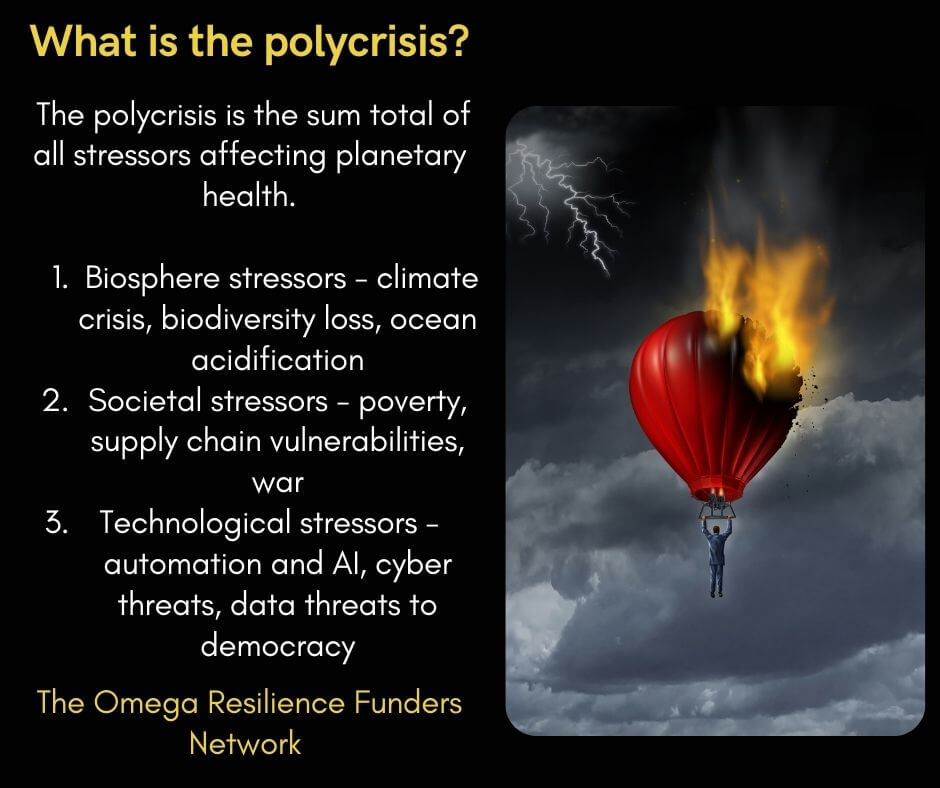
What frightens me about our current predicament is we are not getting ready for the impacts that are coming, or worse, are already here. And boy oh boy, do we need to get ready. Adaptation is now required at speed and scale – for all the extremes we face, which are different based on where we live.
As a result, recently I’ve recognized that my passive approach isn’t matching the urgency, because we have seen such a huge escalation in extreme weather events, global heating, biodiversity loss, fires, floods, crop loss, glacial lake outbursts, and so much more, especially in the last 18 months. This is the escalation we knew was coming for a very long time and it has arrived, so now is the time to shout it from the rooftops so our communities can get ready.
We’ve heard the scientists saying it’s all happening much sooner than expected, and although the timing might be surprising, the events are not unexpected. It was always coming, it was always coming earlier, and it was always going to be stunning (or maybe shocking) when it did arrive.
It’s “early” arrival has left me in a state of shock for at least 18 months, and I’ve been working hard to drag myself out of that state, but the recognition that the time had come hit me like a sledgehammer. So, even when you know what’s coming, it can still shake you to the core.
The current scenario we find ourselves in has been brewing for decades and if our governments had listened to the scientists then, we would be in a very different situation right now.
But that didn’t happen and so today, the message is clear – it’s time to move and act decisively, NOW.
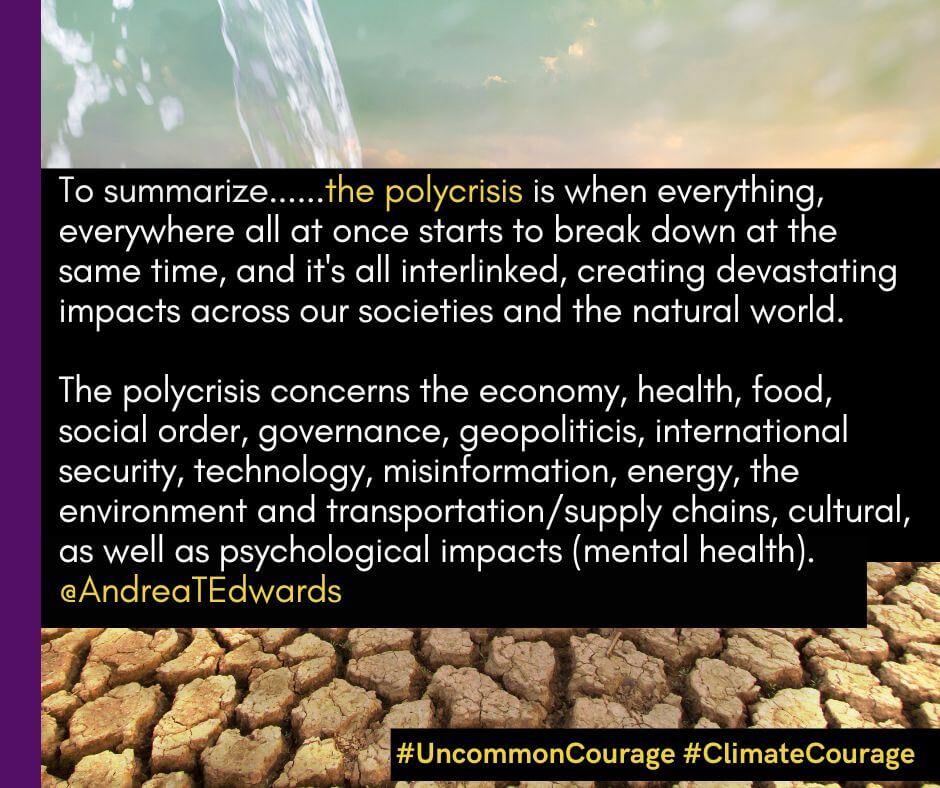
Attempting to speak up
Most of the time, when I speak about the risks we are facing full voiced, it’s with people who are considering the same issues, so we are happy to talk about the tough topics, no matter how ugly it gets. Everything is on the table.
Outside of that, I try very hard not to bring it up in everyday conversations unless I am asked. Then again, even when people ask me directly, it doesn’t always go particularly well, because there is no soft landing with this conversation. It’s a frightening topic to face, absolutely.
Regardless of who I speak to, it’s a hard (oftentimes awkward) conversation to have, but if you ask me a question, I will answer it, even if you don’t like the answer. However, if you don’t ask me, I won’t say anything, even though that’s hard too.
But you get very good at censoring yourself in polite company. I find myself doing it all the time now, even in my livestreams. The scary stuff I read is in my Weekend Reads, but I don’t always share it publicly as a stand-alone, because I know it’s not a good idea to freak everyone out. That said, if you want to find it, it’s always there.
Holding yourself back all the time is hard though, there’s a cost to self-censoring, that’s for sure, but that’s what I’ve had to do, and I know many others are doing it too.
I thought Nate Hagens explained it well in this video
Ripping off the band aid
Anyways, recently I was asked to talk about the climate emergency with a small group of my peers – many are dear friends, and some I don’t know well yet. We’re a great group of people and very supportive of each other’s work, so it felt like a trusted circle where I could share truthfully.
Right up until the day, I didn’t know what I was going to speak about, but after attending an event in the days leading up to this, where the issue of climate was raised in a very light way, I decided I needed to be much more honest about the threat we face, the risks to us and our profession, to our families and communities and to the world, because the urgency is now so dire. I wanted everyone to understand it was time to get ready and it was also time to be part of the fight for our future.
I spoke from the heart, sharing what I’d learned, how it alarmed me, how it impacted me, how it would affect our industries, families, and communities, and why we all needed to start paying attention and getting involved.
My intention was simple – to get everyone paying attention and then try to get them to commit to using their influence to be part of the conversation needed to drive change, because we are now at the point where we need a major uprising in awareness and action.
Check out this recent video from climate scientist Kevin Anderson, which got some solid attention. It resonated with me very powerfully, because it’s all straight talk, which is what I did when I spoke.
But it didn’t go as planned…
Then again, it wasn’t planned, so I shouldn’t be surprised I guess, but I’d never spoken like this with a group outside the circle of confidants who are happy to speak about any issue, even if it’s scary. Maybe I won’t again now… I don’t know.
The backlash felt like a whiplash. Afterwards I heard through feedback that a couple of people thought it was all “doom and gloom,” and they were right, there was a lot of doom and gloom in the message – I took them through the major events of the last 18 months – but it seems the all-important bit at the end, where I talked about what we could do wasn’t heard, just the doom bit. Is that where I went wrong?
I don’t know, maybe I didn’t need to talk through the escalations we’re seeing across the world and the risks now on our doorstep?
But how can you get the message across if you don’t justify it with cold, hard facts?
Maybe I didn’t need to talk through the grief I’ve been experiencing while understanding what this escalation means to all of us?
But how could I convey the urgency and seriousness if I didn’t?
Maybe I didn’t need to be so honest about all of it and just keep it light? Because that still seems to work, right?
But that approach isn’t changing anything. That message is everywhere and it’s not matching the urgency of the situation we are in. The required action isn’t following either.
Because the one conclusion I keep coming to is this – if we can’t face this, how can we ever hope to overcome?
Initially I was really hurt and disappointed, but decided not to waste any time dwelling there, because it’s useless. Instead, I decided to use it as an opportunity to reflect on how I can do it differently, so I can cut through. Because if I’m not being heard, then there’s no point speaking about it at all.
My goal when speaking up is to encourage everyone to pay attention to the risks they face, so they can get prepared and prepare their communities. I want to help, and being prepared is critical, as is helping to mobilize humanity into action. That’s all I seek to do, but it’s not a soft message, it’s a brutal message, because it’s a hard reality we face, and it’s going to be even harder if we do nothing.
“When you want to help people, tell them the truth. When you want to help yourself, tell them what they want to hear.”
Thomas Sowell
Side note: I would love it if those two people who didn’t appreciate what I said (I don’t know who you are and have no interest finding out) would reach out to me so we could speak, because I would love to hear more from you on what you think and why? Maybe you can help me do a better job? I’d sure appreciate the opportunity to understand your thinking, so please, drop me a note if you’re up for that. I would value it tremendously.
So, how could I do it differently?
The first thing I always ask myself is – what’s the benefit to people knowing what we’re dealing with?
Why not let people party and enjoy life? Get on with business as usual?
Maybe ignorance really is bliss?
I sure wouldn’t mind a bit of ignorance around the situation myself sometimes (and I know my hubby would agree with that), but it’s not the path I’ve chosen. I want to know so I can prepare my family. I want to share it, so you can prepare your family too.
Like many, I’m surprised by the rapid intensification of extreme weather events we’ve seen since 2022, but it is happening, so getting ready and being prepared is important. I am experiencing extreme weather events myself, so it’s not some far-off distant thing happening to someone else. It’s here now and it’s coming for all of us.
That’s why I wrote this piece on wet bulb temperatures. I went through wet bulb temperatures for the first time this year, and as I know what these temperatures mean and the threat faced by those of us living in these extreme temperatures, I wanted to make sure everyone else understood too, so they can get prepared to keep their families and communities safe!
And in case you don’t know, wet bulb temperatures are when we reach the limit of human survivability. It’s quite a sombre moment when you first experience this, and interestingly, for those who thought I was early, just look around the world right now, not to mention, the Singapore Government is about to release a paper for its citizens to get ready for extreme heat too – Singapore to launch guide on how to live and play in hotter weather.
Additionally, since publishing my article, apparently wet bulb temperatures will soon be the leading cause of death worldwide – we need to get prepared.
Ignorance is definitely not bliss
The reason that ignorance is not bliss is simple: if you wait for the impacts to arrive before preparing, you could find yourself in a state of chaos – whether it’s due to extreme weather impact, financial impact, businesses gone overnight, loss of everything you value today, loss of life depending on the risks you face, and more.
Truth be told, I don’t want anyone I know or care about facing this. In fact, I don’t want the people I don’t know facing it, especially the poorest in societies across the world. I watched people suffer in the pandemic and I watched my neighbours suffer floods in October 2022, and I want to help alleviate their suffering if I can.
So, I am sharing to help people get prepared. Some of the priorities for all of us, include:
- Understand the environmental/climate risks where you live because every country is different. Just jump onto your AI tool of choice and ask about risks based on where you live. AI isn’t up to date, but it provides a useful overview. Once you know, keep an eye out for news around the issues it covers, however be careful of the media you follow. Some are ignoring this, so if you are witnessing impacts that are not reflected in your local media, maybe look for other media sources covering it
- Look at your financial investments, including your home/s and understand the risks of static assets. Check where your pensions are invested and the risks there too – we are hitting a lot of ‘peaks’ in the investment space, extreme weather events are having a massive impact too
- How about insurance – is your area experiencing more and more extreme weather events and will insurance companies stop insuring your home? It’s already started in Florida, California and other parts of the US. Any changes going on in insurance where you live? Can you afford it if your insurance company increases your contributions? What about if you can no longer be insured?
- What about your industry, your business, your work? With the threat of AI already impacting jobs, including consulting and freelance work, what is the potential impact on yours? Do you know? Have you thought about it? Understanding risks to your work is critical for your future
- What about floods, landslides or droughts, famine? Are you at risk? Have you stocked up on staples, as food shortages and global famine are here and will get worse, with inflation becoming a bigger issue too. Have you planted a garden as back-up? A suggestion – if you live in a landed complex or flats, why not bring the community together and plant a garden. Stock up on water too. Important during wet bulb temperatures
- Do you have independent energy – solar or wind? With increasing temperatures, being independent of the grid will be critical as heat extremes and too much demand could see everything fall over. If you live in a community, invest in independent energy together
- Are you living outside the ‘climate niche’ and if so, can you start getting prepared? Is your country getting ready for heat extremes? But more than short-term preparation, what are the long-term risks to you and your family? Do you know when this heat will have an impact on you – as in hitting ‘too hot to live’ temperatures? How long will it last this year, next year and the next? What does that mean to you? What does it mean to your children?
This is just a sample of questions I want to encourage everyone to ask themselves, so you can be ready for what is coming next. El Niño is expected to deliver temperatures we have never seen before, so we must get ready.
But El Niño will also deliver drought, fire, floods, crop losses and more, and it will be in different parts of the world compared to the La Niña years we’ve just passed. It’s important to know and understand because the warming has already begun.
I’m not sharing a lot of links to data in this blog intentionally. I always do, but today, I just wanted to share some thoughts, however, as we’re talking about El Niño, Australia’s highly respected Bureau of Meteorology (BOM) released this prediction for El Niño last week. There are so many possible variables as to what could happen, but this means – get ready for record temperatures now, before it hits.
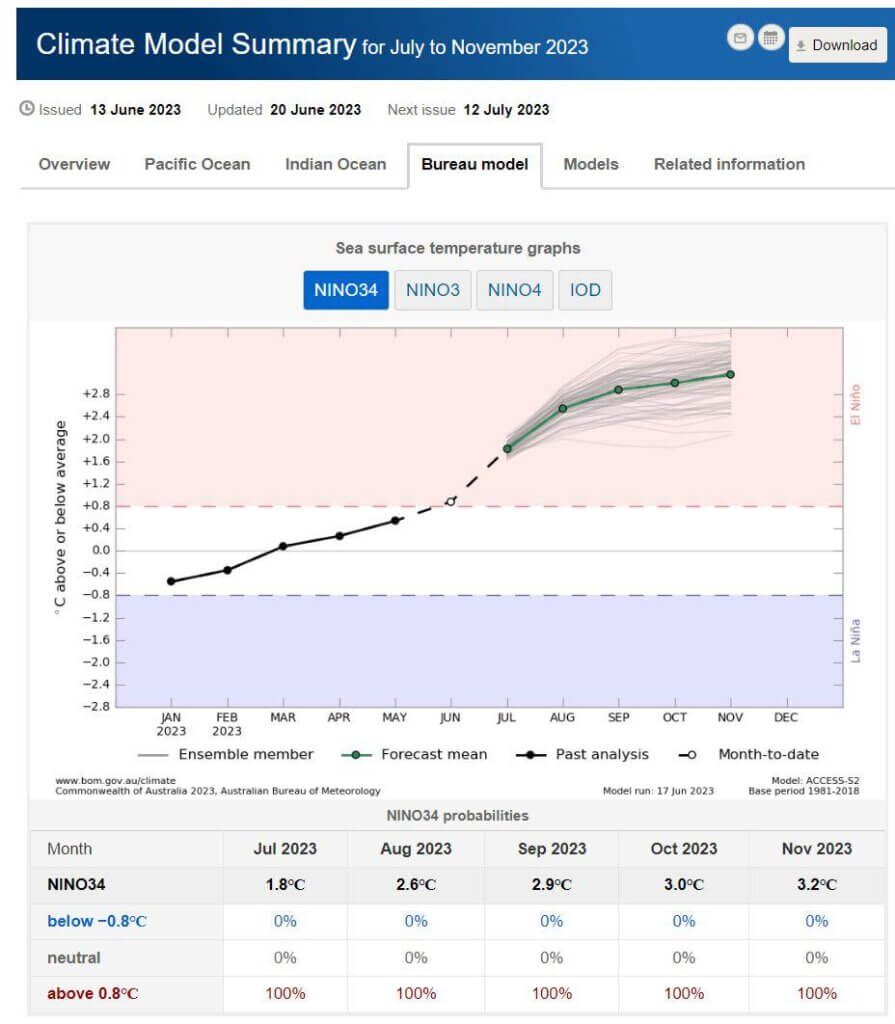
Read my wet bulb guide and here’s a link to the shorter version, which is just focused on actions.
It’s time to get ready
When I speak to people who have zero awareness of the risks they face, I am perplexed. I have looked at the risks for practically every country on earth, I understand what is expected and have a good idea of when impacts will start, although exact timing is a challenge. That said, escalation has already started and will continue to accelerate – regardless of what we do.
For some in my community, it could be instant, but for most, it will feel more gradual – although the current heating projections will not be gradual, but rapid. Regardless of where we are, impacts are coming, in various forms, and preparation is required.
Many people haven’t even started to consider what this means for themselves, and I absolutely appreciate that it is scary to confront, but surely, it’s better to confront it now, before all hell breaks loose?
There’s a book I need to get my hands on, it’s called Collapse Now and Avoid the Rush. The title is very prescient. I’m attempting to avoid the rush. It will be chaos when it happens.
The beauty
I want to share another side to this conversation, which is rarely discussed: once you come to terms with what we are facing – and yes, absolutely, this is a very rough journey emotionally – you reach a level of acceptance, and the next phase is you start to appreciate the beauty of life in a more profound way than you ever have before. You become more present in the moment, more mindful of all life and how you live in the world.
You notice the pollinators in your garden and the birds as they set up their nests. You watch the interplay between nature, marvelling in its beauty. One recent delight is seeing our geckos come back after I thought they were a goner, as the outdoor lights have been devoid of insects for nearly a year. I’m so happy to see them back and getting fat again – hooray! The birds are nesting too, which is a delight to watch, especially after the intense heat we experienced in Thailand in April. I really didn’t know if they would come back after that.
When you see the risks to our natural world, you start to be really present in nature and see how utterly glorious it is. Please remember to look up and around, because it’s a beautiful world.
You also see your family in a different way, treasuring every moment and you stop racing around, because you know that valuing this time is the most important thing you can do right now.
You also connect more deeply to your fellow humans, seeking human interactions versus the machine options we’ve come to accept. I’ve found myself determined to make another human smile, rather than just doing normal stuff, without human involvement and without thought. When human interactions are not positive, it’s ok. You let it go faster because it’s not worth feeling negative about much at all anymore.
Once you see the fragility of our world, understand the peril we’re in, you step into a new version of yourself. It’s a kinder, gentler version. The rage and chaos surrounding you doesn’t impact you so much anymore, because you see it for what it is – fear – and you know that isn’t a useful place to be, especially at this moment in time, when a global transformation of humanity is required.
The path to acceptance
So, there’s a huge benefit here, but first it’s about starting the journey on the path towards acceptance of what is happening, and it’s about finding your path to step away from fear, because you can’t control what’s happening anyway.
If you can face the peril the world is in, you can plan and prepare for whatever is coming your way, and you can be a voice for the change we need to create across the world.
At this stage, the solution is obvious (to me anyway), we need one billion people changing imperfectly right now, so why not be one of the people driving that change? It certainly needs new blood and new energy because those of us who have been doing it for a long time are getting very tired, and for me, I don’t think I’m succeeding anyway, so come and take the reins please?
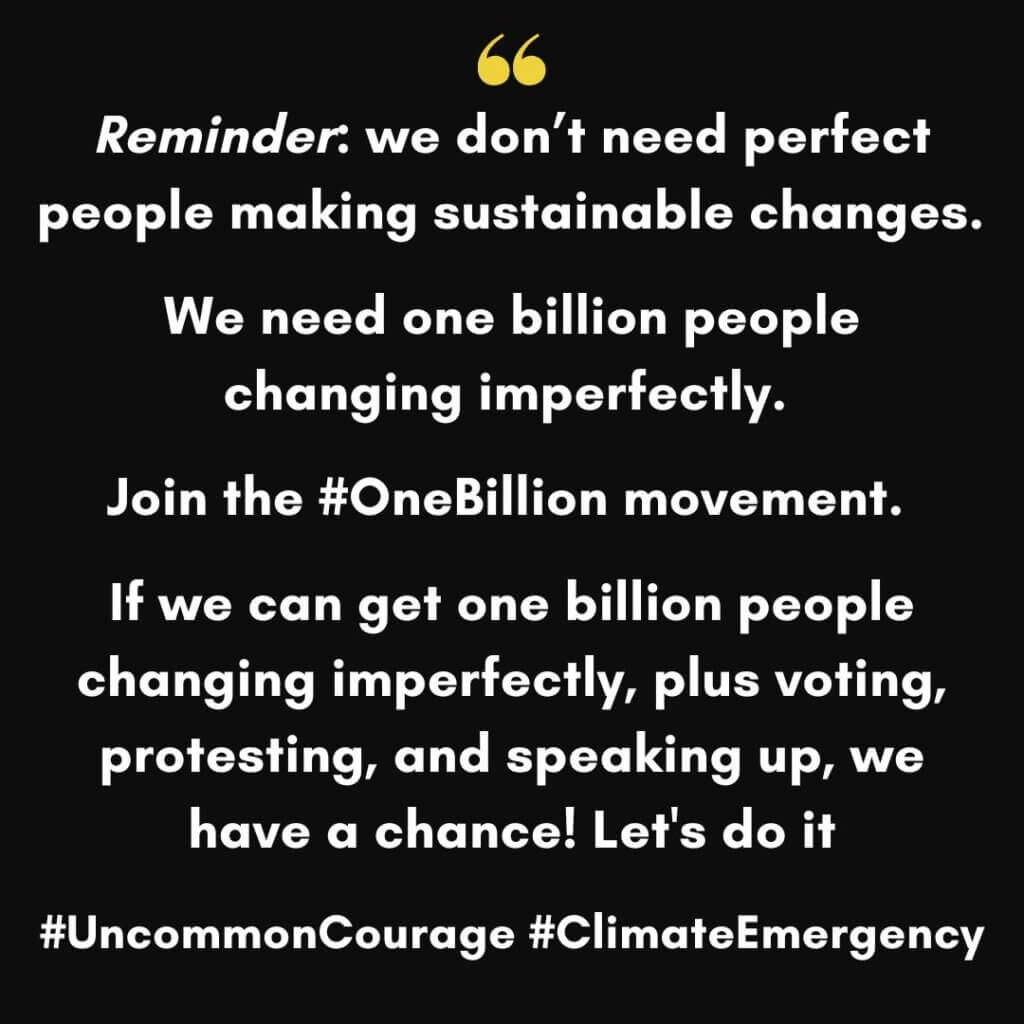
I know this is huge. The path to where I am today has been excruciatingly hard, as it has been for my husband, but I have found when you sit in a place of deep acceptance, from here you can sort your family out, get everyone prepared for the risks, and then get involved locally to help restore our planet and it’s vibrant ecosystems.
When you see what we have done to our earth, you recognize it’s time to waste less, shop differently, change your diet, transform how you work, and essentially take less from our earth. When you arrive at that place, you’ll feel part of a powerful movement working to drive positive change on this planet.
It’s not doom and gloom at the end of the day. It’s about inspiring enough people to want to do something about it, to save our beautiful world for ourselves, our children and future generations.
It’s about facing it, truly understanding what exists that is not in alignment with a healthy planet, and finally saying, I want to be part of this wave of change, so I’ll clean up my own life and then I will get involved with my community and do what I can to help the wider world.
When it comes to speaking up on this, I’ve tried many different strategies and ideas over the years, I’m constantly challenging myself and tearing myself apart to do better, and still, I don’t know the answer of how to do it better. So please, if you know the answer, can you give me a clue?
“When you want to help people, tell them the truth. When you want to help yourself, tell them what they want to hear.”
Thomas Sowell
Signing off
When all is said and done, I am here to help. I would love nothing more than to be wrong, but from all I’m seeing, I know I’m not. I appreciate it’s not a nice message to hear, but we have a chance here, a real chance, but that chance is rapidly slipping through our fingers.
It’s time to grasp this chance and do all we can to regenerate our world in every corner of the planet, and that requires owning up to the fact that the system driving our current existence is incompatible with a future for all life on this planet.
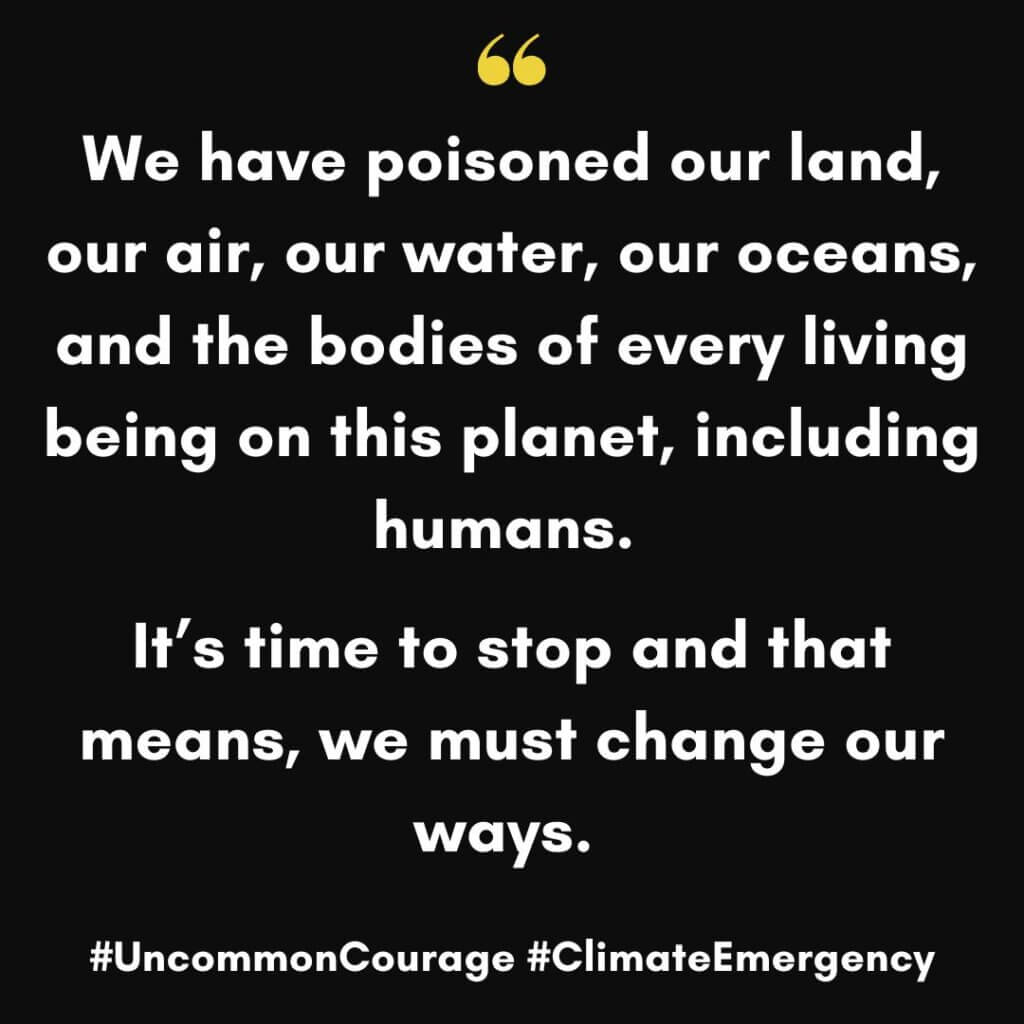
For me personally, these last 18 months of extreme weather events have sent me on a major internal transformation and the deepest time of reflection you can possibly imagine. I will emerge from this soon, with a new outlook, and while I’m not sure how I’ll feel, I know it’s a time to start acting more locally with other people who are driving change and regeneration, and I’m also very present in treasuring my beautiful family and community.
I don’t know who I’ll be when this inner reflection phase is done, but one thing I know is this: I am fighting tooth and nail for my boys’ future, and that is not something I will ever give up on. I’m also fighting for all the children’s futures because they deserve it too. I want them to know there is some level of guarantee in their future, and right now, they don’t feel they have that. We must address that!
If you got this far, thank you. What we need right now is the courage to step into this moment and lead, so, are you a leader the world needs right now? Then off you go! Many are ready to follow.
I look forward to hearing any thoughts you have!
Andrea
Want to get in touch?
All of my contact information is here on Linktree.
Environment education
Four environment resources to help you navigate this challenging territory.
- Knowledge, constantly updating
- Individual action and awareness, so we do our part
- Resources for those struggling with eco-anxiety. Please share with your community.
- Finally, more than 100 mini-videos on many topics regarding the multiple crisis’ we face. Feel free to download and use as your own. No credit necessary.
Uncommon Courage: an invitation
Uncommon Courage is an invitation to be your courageous best self every day. It’s also an antidote to the overwhelm, fear, and rage rolling around the world. But it’s more than a book; it’s an invitation to join an inclusive community that wants to better understand humanities challenges – both global and personal – in order to take courageous action and create a better world for everyone. If Covid19 has given us the time and space to reflect, Uncommon Courage gives us the nudge we need to create lasting change.
You can buy it on Amazon, Apple Books, Barnes & Noble, Book Depository, Booktopia, Smashwords, Kobo, Gardners, Odilo, Indie Bound, BookShop by BookTrib and Scribd.
Better yet, order it from your local bookstore, so you can #SupportLocal.
You can read the reviews, including a new five-star review on Book Commentary, another five-star review on ReaderViews, a review on BookTrib, and three more on Booklife, another on Book Commentary and Blue Ink Reviews. I’m also collating reviews on my Website too. Have a look and grateful to everyone who has written or recorded one.
Come and join the conversation in my Facebook Group Uncommon Courage.
Listen in to the Uncommon Courage, the podcast on Apple, Spotify and everywhere podcasts are published.
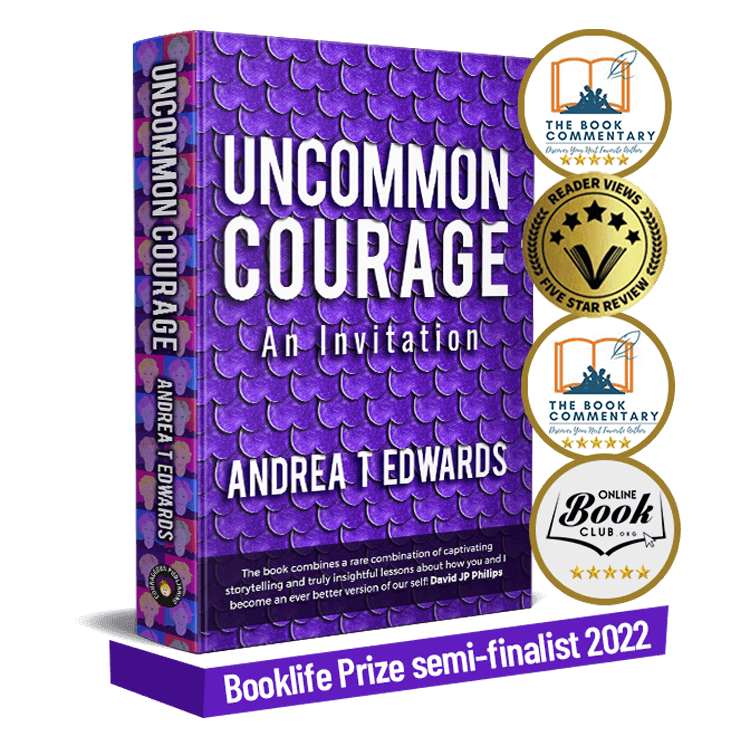
The Know Show – back 1st September
Check out The Know Show. It’s a fortnightly wrap up of the news!
Climate Courage
A fortnightly conversation on issues that matter to you and I, focusing on the actions we can all take.
18 Steps to an All-Star LinkedIn Profile
Listed by Book Authority in the 100 Best LinkedIn Books of All Time and 22 Best New LinkedIn eBooks To Read In 2021 and 2022 categories. Grab it today if you want to take your professional presence to the next level! When it comes to LinkedIn, it really is time to ask — can you really afford not to have this book in the hands of every employee?
Are you a Social CEO? The Social CEO: How Social Media Can Make You A Stronger Leader.
Want to claim your stage? Unleash Your Voice – Powerful Public Speaking for Every Woman
Feedback
Have I done a great job for you? Can you write a reference on my LinkedIn profile or on my Google Business page? If not for me, why not write one for someone else who inspires you or has helped you? Join the #GivingEconomy.


Pingback: #150 Weekend reads – it’s time for a break from the news - The Digital Conversationalist
Hi Andrea,
I did enjoy reading your blog, and the distrust and turning away from climate emergency is a nuisance, but advice I can give is don’t take to heart, because there is a massive player in the background of everybody’s psyche – cognitive error or bias, combined with heuristic shortcuts. So any talk about climate catastrophe flips the switch to off in people, and or it causes people short circuit the situation via quick escape routes(heuristics). Here’s a quick explainer, but some other good articles on the subject https://www.verywellmind.com/what-is-a-cognitive-bias-2794963
Also having a Twitter Space every Saturday #ClimateCrisisClub 11AM EST has proved to be really diverse & friendly. We have a few loose agenda topics which we flunctioate around and other ideas and chat spring up. It’s getting a reputation as very safe place to talk about the unfolding situation. We are on week 30 now and anyone listen and join should they wish. It’s a Club. We have a big mix of artists, scientists, farmers, ecologists, ordinary folk. There are other spaces in myriad of languages pursuing the similar agenda, and despite the annoyance of mElon’s tech chaos have sacked 2 thirds of his staff and the latest tweet limits, it’s made great progress. Best to you, Oliver
Hey thanks for this Oliver, I really appreciate it. Totally get the need to switch off, but you know, the time is here to fight like hell and we need everyone on board. I’ve held myself back for so long – so many of us have – but if we don’t get our heads around this and start getting prepared, it’s going to be so much worse!! Anyhoo I will try and join the club. It’s Saturday night for me, so I’m often distracted – gotta live life, right? xxx
Pingback: What can I do to act on climate & social change? First job is knowledge (2023 edition) - The Digital Conversationalist